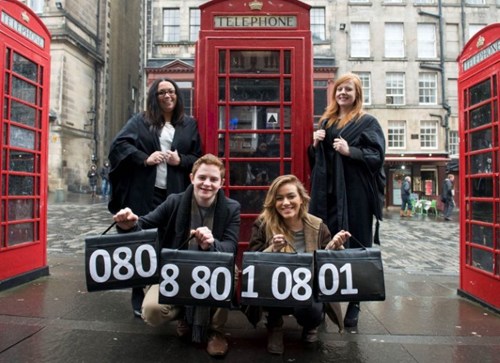At the moment, Scottish Government are currently working to incorporate the UNCRC into Scots Law, which you can hear more about from the Children and Young People’s Commissioner.
The United Nations Convention on the Rights of the Child (UNCRC) sets out the rights every child is entitled to. Scotland is to introduce legislation that provides legal protections of these rights in Scots Law.
Laws are intended to protect you and uphold your rights, but they also place limits on what you can do for your own protection and that of others.
Understanding the law can seem complicated but there is information out there to help you. You can get in touch with Young Scot’s Lawline, the Scottish Child Law Centre, or Clan Childlaw for free legal advice and information about the law.
Need legal advice?
The Young Scot LawLine is available to help answer any question or case in a straight-forward and helpful way, making sure you get the support you need.
Call 0808 801 0801 to speak to the team of legal experts from JC Hughes solicitors to access confidential legal advice, 24/7, that you can trust.
If you are new to Scotland, you can read a guide to Scots Law created by young people. It is available in variety of languages.
Being the victim of a crime
In an emergency or if a crime is happening right now, call 999.
A victim of a crime is when you have been impacted by a crime, for example, you have experienced physical, emotional or mental harm or have suffered economic (for example, monetary) loss because a crime has been committed.
If you have been the victim of a crime, call Police Scotland on 101 to report it.
The Scottish Government have some information on support for victims of crime which you can access even if you haven’t reported the crime to the police. Victim Support Scotland provides support and advice about a range of crimes.
You have rights as a victim of crime, which are set out in the Victims’ Code for Scotland.
If your mental or physical health has been affected by a crime, then you may be eligible for criminal injury compensation, which Clan Childlaw explain in more detail.
If you’ve experienced sexual assault or abuse, there are special services for you to get support, like Rape Crisis Scotland and the Survivor’s Trust. There’s more information about what support is available on our That’s Not OK page.
If you have information about a crime, you can report what you know to the police or anonymously via Crimestoppers or Fearless.
Committing a crime
If you have committed a crime and been arrested, find out what happens next and what to expect. The Centre for Youth and Criminal Justice have a great site you can use to walk through the youth justice system and see what happens each step of the way.
In Scotland, when you are under 18 and are suspected of committing a crime, the police will usually refer your case to the Children’s Reporter, a person who decides whether you should go to a Children’s Hearing. The Children’s Reporter will work with someone called the Procurator Fiscal. The Procurator Fiscal is a legal department that looks at the evidence for a crime and decides what to do next.
If they decide to take your case forward, it is likely you will be asked to attend a Children’s Hearing, where decisions will be made about your case. The Scottish Children’s Reporter has more information about the Children’s Hearing process and your rights.
If you have a family member in prison, then Families Outside provide support and resources for young people.
Complaining about the police
If you feel you have been treated badly by the police you can complain to Police Scotland about what happened. You should get the name and collar number of the officer you are complaining about, which should be displayed on their shoulder. Citizen’s Advice Scotland takes you through the complaints process in more detail.
Police Scotland has more information on your rights when police speak to you. You can find out more about stop and search powers from the No Knives, Better Lives campaign.
Visit the Activate Your Rights homepage to find out more about your rights.

